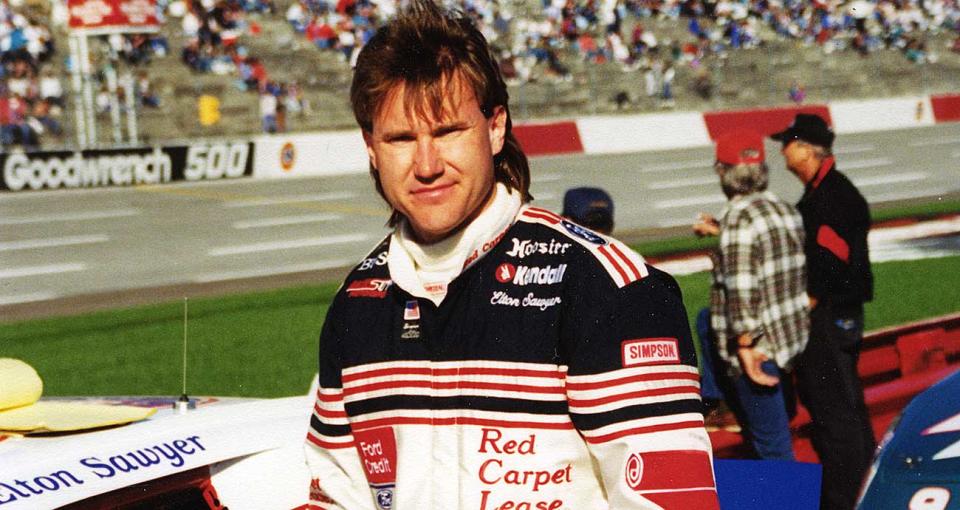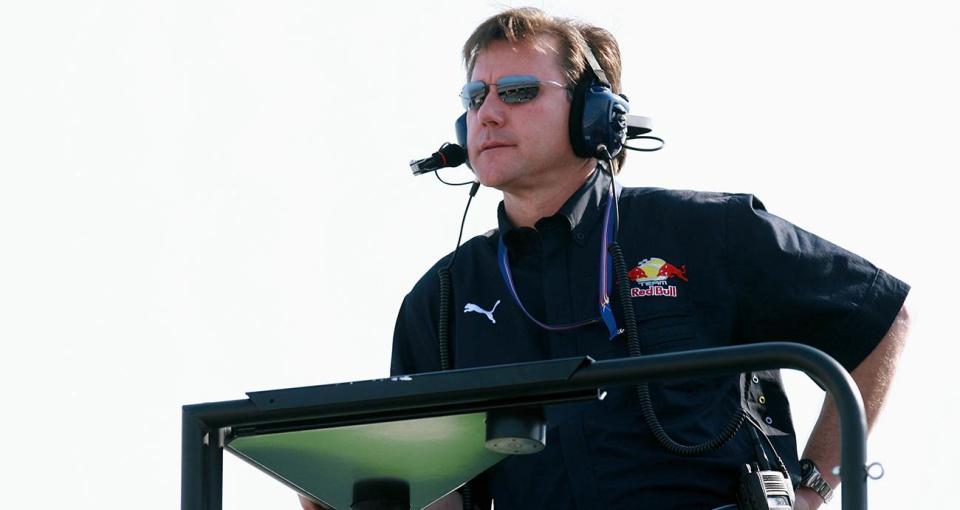From Langley roots to leadership role, Elton Sawyer brings 'nice guy' approach to R&D post
DAYTONA BEACH, Fla. — Growing up, Elton Sawyer had an interest in multiple sports during his high school years, including the three majors of baseball, basketball and football. His appetite for those athletic pursuits fed grand aspirations. But a chance visit to a historic short track near his home led to his life’s calling.
“I think the deciding factor was I had this dream to go to Notre Dame and play defensive back for Coach Lou Holtz,” Sawyer says from a meeting room in the NASCAR Cup Series hauler parked at Daytona International Speedway, “but he wasn’t recruiting like 5-7, 155-pound defensive backs.”
Loosely reenacting the plot of the movie “Rudy” took a back seat to stock-car racing and eventually a long career in what’s now the NASCAR Xfinity Series. Sawyer, now 63, starts the next phase of that career this season, taking on a prime leadership role as NASCAR’s Senior Vice President of Competition.
RELATED: Daytona weekend schedule | 2023 Cup Series storylines
Experience from his driving days and his later work with racing teams have prepared Sawyer for this moment as he enters his ninth season with NASCAR’s competition department. But the lessons learned from his childhood stick-and-ball background still provide Sawyer with a reference point.
“Take football, it’s what you do at the race shop, that’s kind of your defense, right?” Sawyer explains. “And then you get to the race track, and you’re on offense. You practice, and then you qualify and then you race; you’re always trying to get to the next position or lead the most laps. And then you’ve got your pit crew, which is kind of your special teams. So you know, I like team sports. I’ve always enjoyed, whether it’s high school basketball, high school football, or baseball, I enjoy being on the team. Now, as I’ve gotten older, I enjoy being part of the management of the team. …
“The best way I can describe it is I enjoy the process. I enjoy, again, our team, just watching everybody really work hard to prepare and then go out and execute.”
Setting the foundation
Elton Sawyer recalls being a high school junior when his father, Everett, first took him to Langley Speedway, a .395-mile bullring not far from the family’s hometown of Chesapeake in the Tidewater area of Virginia.
Interest grew quickly, and soon the family was occupying Langley’s garage and pit area instead of the bleachers. Everett Sawyer began racing there in 1976, and Elton followed suit two years later as he wrapped up his time at Great Bridge High School. Elton’s younger brother, Roger, and a cousin named Earl also raced there.
“We all kind of came along, and it was a family event,” Sawyer says, noting their start in the entry-level Street Division. “We’d go work on cars behind the house in the garage, and then it just continued.”

Elton Sawyer quickly laddered up to become one of Langley’s hotshots. His season tally of wins regularly tripped double digits, and he was the speedway’s track champion for three consecutive years from 1983-85. In two of those years, Sawyer’s accomplishments earned him the Mid-Atlantic regional championship in what’s now called the NASCAR Advance Auto Parts Weekly Series.
By then, Sawyer had started to explore the Late Model Sportsman ranks — a circuit that later was called the Busch Series and has evolved into today’s Xfinity Series. Sawyer made that tour his home as a series regular starting in 1986, and his career spanned a who’s who of legends from that golden era who made their mark there.
Sawyer rattles off the stellar names from his earlier days in that national tour — Jack Ingram, Sam Ard, Tommy Ellis, Tommy Houston, L.D. Ottinger — and then adds some of the regular visitors from the Cup Series in that era — Dale Earnhardt, Darrell Waltrip, Terry Labonte, Harry Gant, Morgan Shepherd. “You put that group there, and then you go to an event and you have success,” Sawyer said, “you can walk out of there with your head pretty high.”
The names changed for Sawyer’s later years in the series, but the quality of competition remained high, and he listed Jason Keller, brothers David and Jeff Green, Bobby Labonte and Chad Little as just a handful among the many standouts. During that time, he often raced alongside his wife, Patty Moise, a veteran of 133 Xfinity starts, and he collected two victories — his 1994 breakthrough at the old Myrtle Beach Speedway and later in 1999 at New Hampshire Motor Speedway.
MORE: Elton Sawyer’s career statistics
“He kind of mirrored what my brothers and I kind of went through growing up. We worked on our cars, we kept them up and we also got to drive,” said David Green, the 1994 Xfinity Series champion who now works alongside Sawyer as a chief safety official. “But I can remember Elton the most being the Mr. Nice Guy. Of course, Bobby Labonte, who I drove for, he for years accused me of being a nice guy and said nice guys didn’t win all the time. But Elton won, and I was able to win some, so I think nice cars do win.
“But that’s the biggest thing with Elton is he was always very professional on the race track. You kind of knew who you were racing against, whether it’s Daytona or Hickory or whatever fell in between. So that’s what I remember the most.”
New era at R&D
David Green hadn’t been working at NASCAR for long when Sawyer joined the team at the Research & Development Center in 2015, but he remembers fondly his feelings at hearing the news. Sawyer had spent time working with race teams, serving as competition director at the former Red Bull Racing organization as one of his stops along the way.
Sawyer’s first appointment with NASCAR was as director of the Camping World Truck Series, but it also meant that Green was getting a colleague who was cut from the same racing fabric.
“I went from feeling very comfortable with the company prior to this announcement to feeling extra comfortable, meaning that was just another guy that was joining our forces that we all grew up doing the same and have seen every side of it,” Green says, noting the tenures of former drivers Chad Little and Brett Bodine with the R&D Center. “The list goes on, right? Now all of a sudden, we’re getting some racers in there, and we kind of talked the same language. Not that the rest of us weren’t talking the same language, but there’s just a really good feel for me in also knowing Elton’s background. …

“But when he joined us, it was such a good feeling for me internally to know that I had somebody that was going to be a true supporter and understood everything we deal with within the garage on a day-to-day basis.”
As for the even-keel demeanor that Green referenced during their racing days, Sawyer says he’ll carry that same straightforward style into this role rather than adopting an iron-fist approach.
“I would look at it more as we hold all the cards, we as NASCAR, so we know what all the teams are doing,” Sawyer says. “It’s a fact-finding exercise a lot of times — here’s the topic of discussion, gather the facts and then we make a decision. So the teams are our customers, and we want to treat them with respect. There’s going to be some tough decisions, and we’re going to tell them, here’s what we’re doing, and we’ll make those decisions as the sanctioning body, and that’s what we’re going to do.
“In our meetings, the things we talk about are we want the level playing field to be equitable across the board for all competitors. We want it to be a safe environment to the best of our abilities; we’re inherently a dangerous sport. And we don’t want to over-officiate. So when we can check the boxes on those three things when we leave an event, then we kind of feel like we’ve done our job and we’re not the story on Monday.”
Sawyer officially took the post Jan. 18, replacing Scott Miller, who was tapped for a new role as competition strategist. Sawyer previously served as vice president of officiating and technical inspection, a position where he helped shape the rules and penalty procedures and other elements of the week-to-week scrutineering of race vehicles.
It’s experience that’s bolstered by his involvement in multiple facets of the sport — as a longtime driver, a team principal and now as a top NASCAR official.
“Elton‘s got a cool head on his shoulders. I respect the hell out of him,” says veteran driver Brad Keselowski, now starting his second season as a Cup Series team co-owner. “I think he‘s seen this sport through a lot of different lenses — a driver being one of them, and at one time, I think he was a team president or something to that effect. He understands the competitive element from the drivers and team side, and he‘s been at NASCAR for at least a half-dozen years. I think he‘s a really well-rounded person who has the ability to see a bigger picture than most anyone else in his shoes.
“I think he‘s earned his opportunity. It‘s a big hire for NASCAR — a big gain. If you would‘ve challenged me to sit down and find five or 10 names to put in a hat for that position, given Scott Miller‘s semi-retirement, he would have certainly been one of the men I‘d put in that hat. I thought it was a really good move.”
RELATED: At-track photos: Daytona
The time will inevitably come this season when a competitor will have to heed a summons to the Cup Series hauler. When that happens, the expectation, Green says, is a firm-but-fair consultation instead of a stern, boisterous talking-to.
Proof positive, he says, that nice guys do win, even if it’s not necessarily as a defender in the Notre Dame secondary.
“To me, the nice guy on the race track generates an X-amount of respect,” Green says. “So yes, the guy that really beats it up to people, right, sometimes gets a little bit of respect because this guy’s gonna call it like it is and be tough to deal with. But in my career and what I’ve seen, and I owe a lot to Bobby Labonte and guys like Elton Sawyer, the good guys get an equal amount of respect. It’s a little bit different kind of respect, but the end result is respect. So to me, the fact that he’s got his mannerisms how he handles the garage is so reassuring and really gives us a lot of confidence to come out in the garage and do what we do. So that nice guy approach to me got Elton Sawyer nothing but leaps and bounds in respect, not only from us competitors, but then now the road that we’re in now. I know he is cut out for that job, and he’s shown that throughout the years he’s been with us. …
“I’m going to be a little bit prejudiced in saying I’m glad he’s in our corner because now, as a NASCAR official inspector and a guy that’s really got to keep your foot down when it counts, for when it matters and when it even doesn’t matter, I’ve got the guy that supports us through thick and thin. So a totally different kind of respect.”

